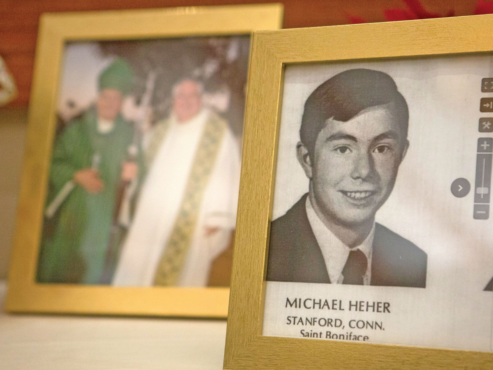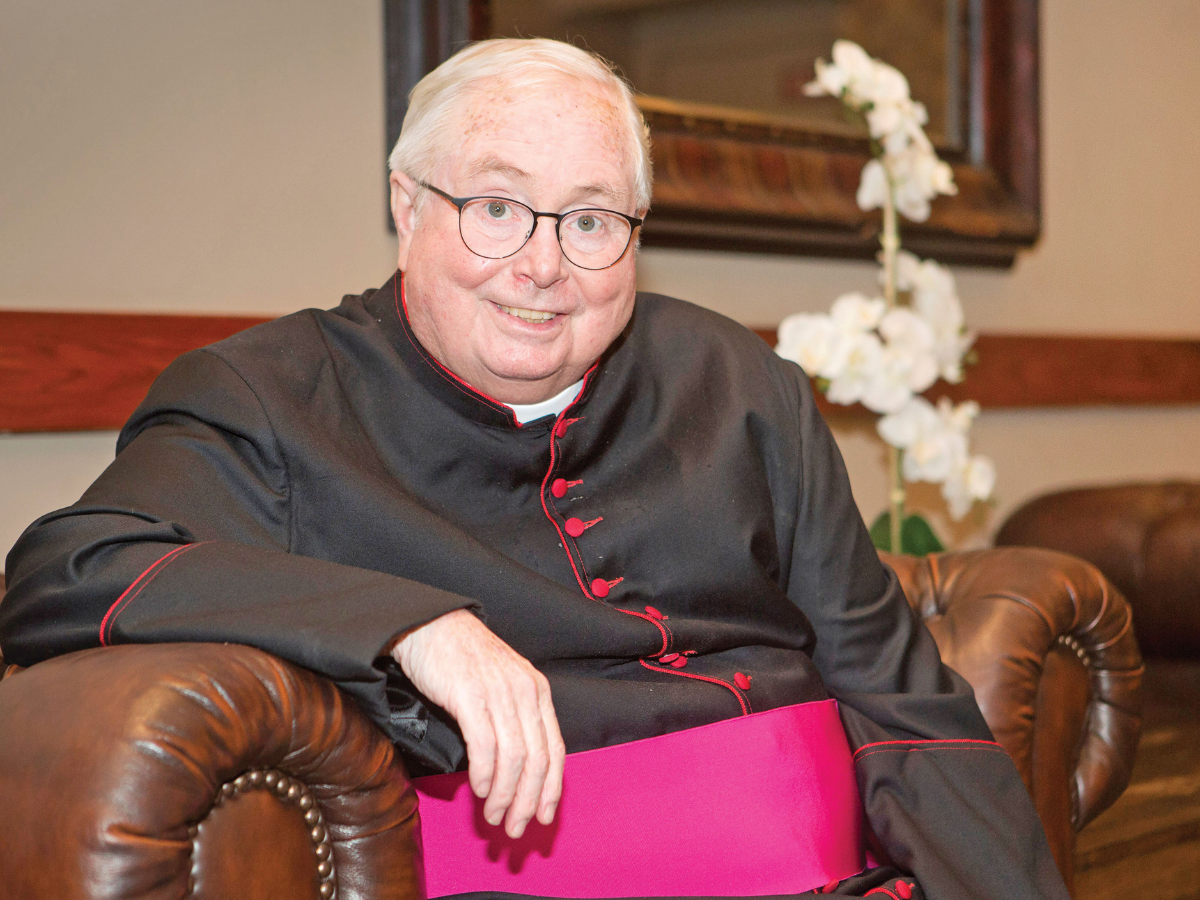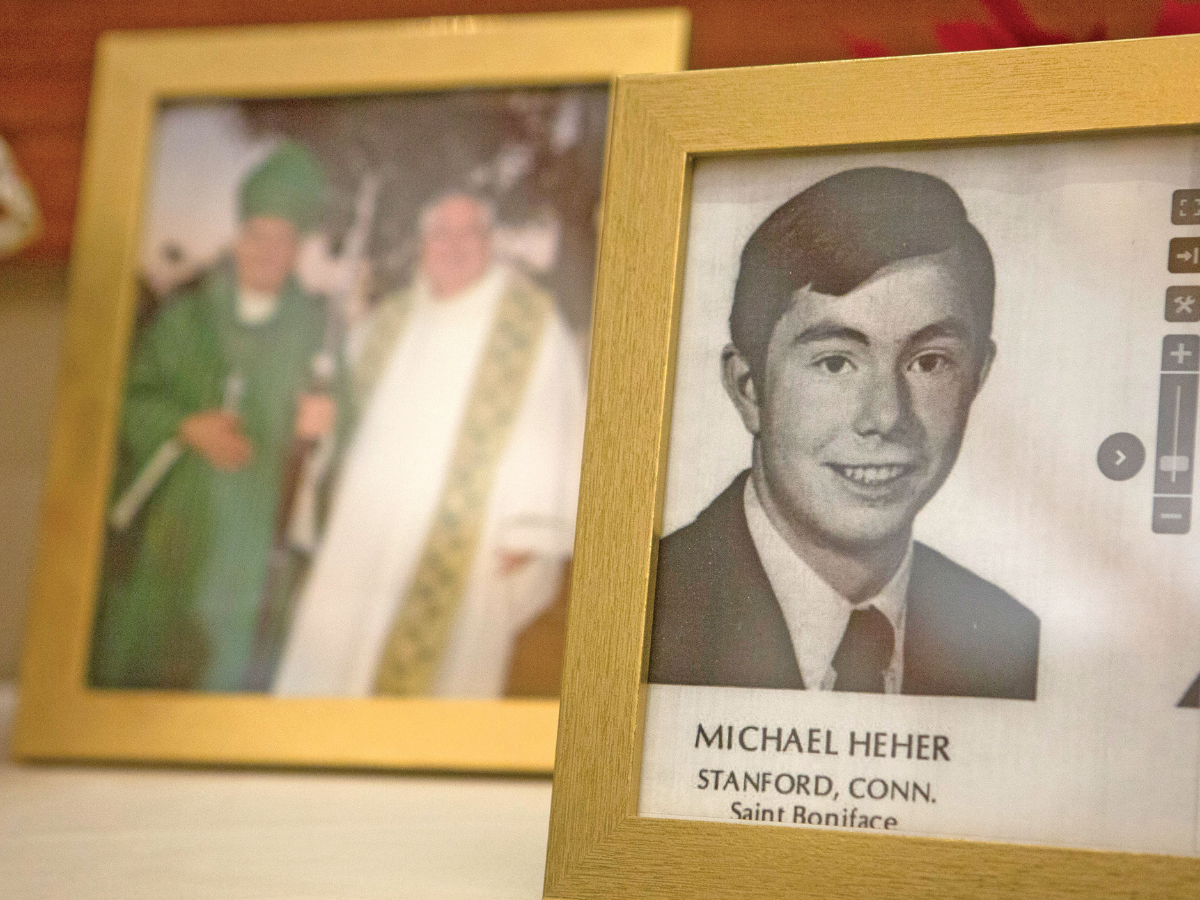Monsignor Michael Heher likes to joke that his retirement won’t be very different from his time as a parish priest.
“I just don’t have to administer and worry about the money,” he said.
Such self-effacing humor is just part of what has made Heher a beloved pastor during his years in the Diocese of Orange.
When he was told that a story was being written about his retirement, the monsignor said he couldn’t imagine why that would interest anyone.
The disarming humor belies a keen intellect that has made Msgr. Heher invaluable in the leadership of the Diocese. Although he always aspired to be nothing more than a parish priest, those around him saw greater things. He studied in Rome for four years, earning his doctorate in fundamental theology from the Pontifical Gregorian University.
During his time with the Diocese, Msgr. Heher has not only been a monsignor, he was also the vicar of priests, meaning he was the one to whom priests went to for guidance.
About that position, he said, “If you can help a priest, you help all they touch.”
Msgr. Heher was also vicar general. While in that job, he was the lone cleric in 2005 on a team of lawyers that worked on settlements of the victims of sexual abuse in the Diocese during the scandals that rocked the Church in the 1990s and 2000s.
“I said, ‘I think you should have a collar there,’” he said. “What else do we do that’s more important?”
Heher said having the Diocese represented was critical to show that the Church cared for the victims.
“Little by little we got things done,” he said. “It was very strenuous.”
During his “retirement,” Msgr. Heher looks forward to continuing to perform priestly duties, such as Masses, marriages, funerals, confession and visiting the ailing and delivering Communion.

PHOTOS OF MSGR. HEHER’S LONG CAREER IN THE CHURCH ON DISPLAY AT HIS RETIREMENT PARTY. PHOTO: DREW KELLEY
A WRITER’S LIFE
He also said he hopes to have time in retirement to read and write.
In 2004, Msgr. Heher wrote a series of essays entitled, “The Lost Art of Walking on Water: Reimagining the Priesthood.”
That book, which won a Catholic Publisher’s Award for Best Theological Book, came out of presentations he gave to fellow priests on retreats.
A review of the book read, “there are many books about priests, but few to priests themselves by one of their own – engagingly written – insightful reading for lay people.”
In his introduction, Msgr. Heher wrote that there was a perception that the parish priest lived a life of dullness and drudgery, in which he is overburdened, understaffed and stained by scandal. He wanted to disabuse fellow priests of the notion.
“Most disturbingly,” he wrote, “we don’t aspire, as we might, to be as excellent or as talented or as creative as we can be.”
The book was also described as containing “Candid, thoughtful essays that encourage parish priests confronted by such challenges as prayer, obedience, celibacy, depression and church leadership.”
For his next book, Msgr. Heher said he’d like to write another series of essays, but this time directed toward lay people.
“I want to talk about spirituality in a way that isn’t pious,” he said, adding, “there’s nothing more dangerous than a pious priest.”
Msgr. Heher says it is important to engage with people on a personal level.
“You have to get to the point where you’re not thinking as a priest but as a human,” he said. “If you meet people as yourself, they are much more able to tell you what’s going on.”
Msgr. Heher also wants to spend extra time reading. Particularly, he is interested in revisiting some of the work of best-selling author and essayist Ann Patchett, whom he greatly admires.
“I was going through my books recently and I thought her books were worth returning to. I’m in a much different place now. I first read her as a young man,” he said.
Patchett thinks highly of the monsignor as well. Her recommendation is part of the dust cover of Msgr. Heher’s book that says, “Read this book for its honesty and its wisdom, hen buy a copy for everyone you know.”
LIFELONG PURSUIT
Msgr. Heher says from an early age he knew he wanted to be a priest, although he’s not sure why. After attending high school, Msgr. Heher was ordained in 1978 and assigned to St. Bonaventure Church in Huntington Beach. He was part of the inaugural class of priests assigned to the new Diocese after its creation in 1976.
Msgr. Heher was made Director of Family Life upon his return from Rome, then assigned to St. Irenaeus in Cypress, a large bustling parish with 5,000 families where Masses were held in three languages. It was an exhausting stint, he said.
For the past 12 years or so he says he has been connected with St. Anne Catholic Church in Seal Beach. When talking about being named a monsignor, in his typical humorous way, Heher said, “It means you have to go out and buy a new cassock.”
On a more serious note, Heher said the recognition came at an important time. He had been deeply saddened and at a low point after representing the Diocese in the sex abuse settlements.
“Every now and again, someone needs an attaboy,” he said. “I got my attaboy.”


